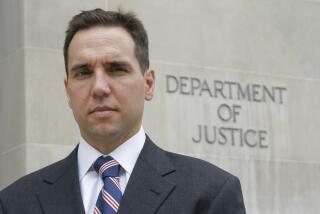Meese Dating Scandal to January, 1985
WASHINGTON — Atty. Gen. Edwin Meese III on Monday raised the prospect that potentially criminal behavior in the Iran- contras scandal may have started earlier than believed, listing January, 1985, as the starting point from which an independent counsel should begin searching for possible illegal activities.
The earliest date previously mentioned in the scandal had been June, 1985, when the National Security Council circulated a secret CIA memorandum that suggested easing the U.S. embargo on arms shipments to Iran.
Meese listed the January, 1985, date in his application to a special three-judge federal court for appointment of an independent counsel to investigate whether Marine Lt. Col. Oliver L. North, a fired NSC aide, possibly acted “in concert” with others to break federal law.
No Charges Filed
However, Justice Department and FBI officials declined to discuss the significance of pinpointing January, 1985, as the time when possibly illegal actions may have begun, nor did they cite any specific federal statutes that North or others may have violated. Although several figures have been linked to the operation, no one has been charged with committing any crimes.
Meese’s application, submitted to the court last week but made public Monday at his request, suggested that the independent counsel would have to possess extraordinary qualifications to resolve questions “of unusual sensitivity, complexity and importance to the nation.”
The qualifications included substantial knowledge and experience in “national security and defense, intelligence, counterterrorism, foreign aid and foreign military sales, as well as a familiarity with the manner of execution of American foreign policy, the organization of the intelligence community and procedures relating to classification of information, privileges and authorizations.”
List of Candidates
Because only a relatively small number of potential counsels would possess such characteristics, Meese’s application indicates that the three-judge panel might require some time to find such an individual. However, Judge George E. MacKinnon of the U.S. Court of Appeals here, who heads the special panel that will make the appointment, has said that the judges have a list of several potential candidates.
Unlike earlier requests for independent counsels, formerly known as special prosecutors, Meese’s application did not outline any specific suspected criminal activity. An official familiar with the application said that attempting to spell out or define possibly illegal activity would result in limiting the investigation.
A preliminary draft of Meese’s application had listed specific laws, such as that which authorizes the 1986 intelligence budget, which barred direct or indirect military aid for the contras during the year that ended Sept. 30, and the Arms Export Control Act, which prohibits the export of weapons to Iran.
These laws carry no criminal sanctions. However, legal authorities on Monday stressed that conspiracy to violate such laws could amount to criminal activity and, therefore, could result in prison sentences.
Scope of Conspiracy Law
Gerald M. Caplan, a George Washington University Law School professor specializing in criminal law, cited the American Law Institute’s commentaries on the model penal code to support his conclusion that the conspiracy law is broad enough to cover possible violations in the current scandal.
The institute said that conspiracy “not only includes some offense carrying only civil penalties . . . but also reaches much conduct that would not otherwise be an offense through a loose interpretation of the word defraud.”
The federal conspiracy statute outlaws two or more individuals conspiring “either to commit any offense against the United States or to defraud the United States. . . . “
Terry Eastland, the Justice Department’s chief spokesman, said that copies of Meese’s application would be sent to the Senate and House Judiciary committees.
More to Read
Get the L.A. Times Politics newsletter
Deeply reported insights into legislation, politics and policy from Sacramento, Washington and beyond. In your inbox three times per week.
You may occasionally receive promotional content from the Los Angeles Times.










